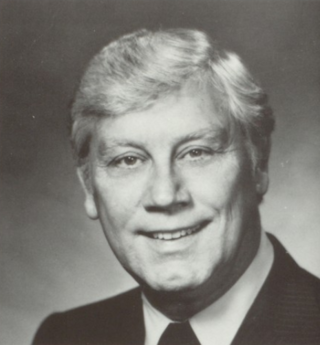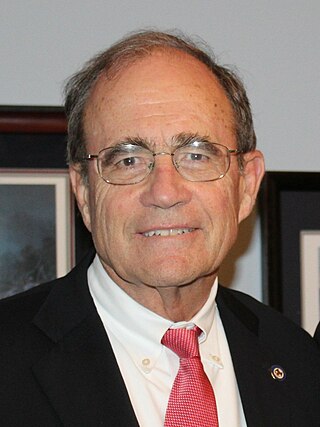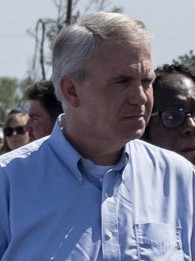Current commissioners
The current commissioners are: [8]
- Charles Busby (Republican)
Southern District
| Agency overview | |
|---|---|
| Formed | 1992 |
| Preceding |
|
| Jurisdiction | State of Mississippi |
| Headquarters | Jackson, Mississippi |
| Agency executives |
|
| Child agency | |
| Website | mdot |
The Mississippi Transportation Commission is a government agency in the U.S. state of Mississippi which is responsible for overseeing the Mississippi Department of Transportation, overseeing the transportation industry, and formulating state transportation policy. It is the only popularly-elected state transportation board in the United States.
On March 29, 1916, the Mississippi Legislature created the Mississippi State Highway Commission. Originally consisting of three members, the commission held its first meeting on April 14 to discuss the disbursement of federal funds and coordinate a highway planning program with the U.S. Bureau of Public Roads. In 1920, Governor Lee M. Russell expanded the commission with five additional members. In 1930, the legislature passed the Stansel Act, restoring the commission as a body consisting of three popularly elected commissioners. [1] In the 1980s, Governor William Allain pushed for the State Highway Department to be reorganized—with the highway commissioners to be appointed by the governor and not popularly elected—but his proposal failed due to legislative opposition. [2] In July 1992, the State Highway Commission and State Highway Department were reorganized as the Mississippi Transportation Commission and the Mississippi Department of Transportation. [1] [3] Dick Hall was the longest-tenured transportation commissioner, serving from 1999 until 2019. [4] Willie Lee Simmons, the first black person to serve on the commission, assumed office in 2020. [5]
The Mississippi Transportation Commission is a part of the executive branch of Mississippi's state government. [6] It is the only popularly-elected state transportation board in the United States. [7] Per state law, the commission is responsible for developing an intermodal transport policy for the state. It oversees all aeronautical, highway, port, railroad, and public transit in Mississippi. The commission appoints the executive director of the Mississippi Department of Transportation to oversee daily administrative matters in the agency, [8] with their choice subject to the approval of the Mississippi State Senate. [7] A majority vote of the commission is required to disburse money from the state's Emergency Road and Bridge Repair fund. [9]
The Mississippi Transportation Commission is led by three commissioners. One commissioner is elected by voters in each of the state's three Supreme Court districts, and the commissioners elect a chairman among their own members. [8] The commissioners' individual salaries are $78,000 per year, but are set to increase to $95,000 annually in 2024. [10] The Commission meets on the second and fourth Tuesday of each month at its offices in Jackson. The Central District commissioner keeps an office in Jackson, while the Northern District commissioner keeps an office in Tupelo and the Southern District commissioner maintains one in Hattiesburg. [8]
The current commissioners are: [8]

William Aloysius Allain was an American politician and lawyer who held office as the 59th governor of Mississippi as a Democrat from 1984 to 1988. Born in Adams County, Mississippi, he attended the University of Notre Dame and received a law degree from the University of Mississippi School of Law in 1948.

The governor of Mississippi is the head of government of Mississippi and the commander-in-chief of the state's military forces. The governor has a duty to enforce state laws, and the power to either approve or veto bills passed by the Mississippi Legislature, to convene the legislature at any time, and, except in cases of treason or impeachment, to grant pardons and reprieves.

The Mississippi Senate is the upper house of the Mississippi Legislature, the state legislature of the U.S. state of Mississippi. The Senate, along with the lower Mississippi House of Representatives, convenes at the Mississippi State Capitol in Jackson.

State Treasurer of Mississippi is a post created in 1817 when the state was admitted to the Union. Before the state was formed by splitting the Alabama Territory from the Mississippi Territory, an equivalent post was the Territorial Treasurer General, established in 1802.

The Mississippi Legislature is the state legislature of the U.S. state of Mississippi. The bicameral Legislature is composed of the lower Mississippi House of Representatives, with 122 members, and the upper Mississippi State Senate, with 52 members. Both representatives and senators serve four-year terms without term limits. The Legislature convenes at the Mississippi State Capitol in Jackson.

The lieutenant governor of Mississippi is the second-highest ranking elected executive officer in the U.S. state of Mississippi, below the governor of Mississippi, and is the only official in the state to be a member of two branches of state government. The office of lieutenant governor was established when Mississippi became a state in 1817, abolished for a few decades in the first half of the 19th century, and restored later in the century. The lieutenant governor serves a four-year term with a two consecutive term limit. The current lieutenant governor is Delbert Hosemann, a Republican, who has held the office since 2020.
The Michigan Department of Transportation (MDOT) is a constitutional government principal department of the US state of Michigan. The primary purpose of MDOT is to maintain the Michigan State Trunkline Highway System which includes all Interstate, US and state highways in Michigan with the exception of the Mackinac Bridge. Other responsibilities that fall under MDOT's mandate include airports, shipping and rail in Michigan.

The attorney general of Mississippi is a statewide elected office in the U.S. state of Mississippi. The attorney general is a constitutional officer responsible for representing state agencies in legal matters, supplying other state officials and prosecutors with legal advice, and bringing lawsuits on behalf of the state. They serve a four-year term with no term limits.

The Mississippi State Highway System is a network of roads that are maintained by the Mississippi Department of Transportation (MDOT). This network includes Interstate, U.S., and state highways.

The Mississippi secretary of state is an officer of Mississippi originally established under the Article IV, §14 of Mississippi Constitution of 1817, and was reestablished under Article V, §133 of the Mississippi Constitution of 1890.

The Mississippi Department of Transportation (MDOT) is the organization in charge of developing and maintaining all state and federal roadways in the U.S. state of Mississippi. In addition to highways, the department also has a limited role in supporting Mississippi's public transportation system, ports and waterways system, aeronautics and railroads. MDOT is headquartered in downtown Jackson.

The Mississippi Public Service Commission is a government agency which regulates telecommunications, electric, gas, water and sewer utilities in the U.S. state of Mississippi. The commission was created in 1884 and in its early history was tasked with regulating various transport and telecommunications industries in the state. It assumed its current name in 1938 and was given jurisdiction over electric, gas, and water utilities in 1956.

The 2015 Mississippi gubernatorial election took place on November 3, 2015, to elect the Governor of Mississippi. Incumbent Republican Governor Phil Bryant ran for re-election to a second and final term in office. This is the highest percentage that a Republican has ever won in a gubernatorial election in Mississippi.

Brandon Everitt Presley is an American politician who served as a member of the Mississippi Public Service Commission from the Northern District from 2008 to 2024 and mayor of Nettleton, Mississippi, from 2001 to 2007. He is a member of the Democratic Party.

A general election was held in the U.S. state of Mississippi on November 3, 2015. All of Mississippi's executive officers were up for election. Primary elections were held on August 4, 2015, with primary runoffs to be held on August 25, 2015 if no candidate received a majority in the primary. The filing deadline for primary ballot access was February 27.

Willie Lee Simmons is an American politician and former member of the Mississippi State Senate from the 13th District, where he served from 1993 to 2020. Simmons ran and won the election to the Mississippi Transportation Commission for the Central District. Prior to serving in the senate, he worked in the Mississippi Department of Corrections.

A general election was held in the U.S. state of Mississippi on November 5, 2019. All executive offices in the state were up for election. The primary election was held on August 6, 2019, and runoff elections were held on August 27, 2019. Although the Democrats came close to winning the governorship, they ultimately failed to do so. In addition, they lost the sole statewide office they have held since 1878: the Attorney General.

The 2023 Mississippi elections took place on November 7, 2023, with the primary on August 8 and any required runoffs on August 29. All executive offices in the state up for election, as well as all 52 seats of the Mississippi State Senate, all 122 seats in the Mississippi House of Representatives, and many local offices. The qualifying deadline for all 2023 Mississippi races was February 1, 2023.
John Caldwell is a Mississippi politician serving on the Mississippi Transportation Commission for the Northern District since 2020. A Republican, he previously worked as a transportation director for the largest school district in Mississippi and later served as DeSoto County supervisor. He ran for election to the Mississippi Transportation Commission in 2011 but lost. He ran again and won in 2019.

Dick Hall was a Mississippi politician who served on the Mississippi Transportation Commission for the Central District from 1999 to 2019, the longest tenure of any commissioner in state history. He also served in the Mississippi State Senate and Mississippi House of Representatives for three terms each. He was a Republican.